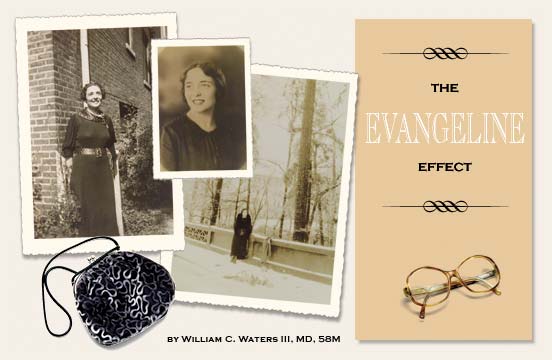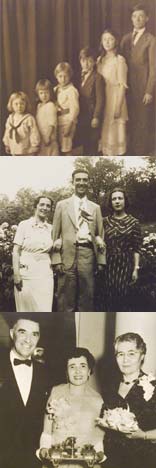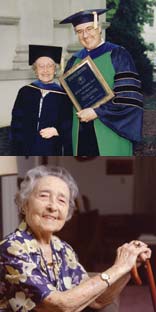
The first thing we all noticed was the flying chalk.
As white flakes cascaded to the floor, we decided we had never seen anyone write so fast on a blackboard. And then we watched the intensity, the focus—and the joy—of this bustling, faintly smiling, diminutive woman as she unraveled the molecular mysteries of the B vitamins. Immersed as we were in the murky amino acid soup of biochemistry in 1954, we suddenly encountered something charming in lipothiamine pyrophosphate, something dramatic in niacin deficiency. Pressed, muddled, and slightly fearful, like most freshman medical students, we now began to form a new vision: We wanted to become engaged, vivacious, passionate. In other words, we wanted to be Dr. Evangeline T. Papageorge.
In this
little exercise this amazing teacher had not, you understand, broadcast
her seeds of wisdom wastefully upon a parched plain. She had first plowed
the soil, tilled it—titillated it. Now even ordinary data would germinate
vigorously in our newly galvanized young minds.
This was
my first exposure to The Evangeline Effect. The next occurred when, walking
with her across the tiny quadrangle between Anatomy and Physiology, she
outlined to me her original PhD project. Her pace, already brisk, quickened;
and her voice, already animated, heightened as she went into transport
over the genetic defect of 2 phenylketonuria. I learned something, of
course, but now mainly I wanted to rededicate my life to genetics.
Another
stanza of The Effect appeared at midyear. One of our classmates was discovered
one night sitting in a corner of a classroom—catatonic. Later, as
he received inpatient therapy for what was feared to represent emerging
schizophrenia, Dr. Papageorge left her lab and her podium and her office
to visit the parents at their home. Evangeline, the teacher, the administrator,
the researcher, had adopted still another role—cheerleader.
Her myriad
faculty assignments included from time to time the admissions committee.
One candidate had applied after a Vietnam tour complicated by an arduous
period as a POW. A committee member suggested a psychiatric exam in view
of the emotional trauma the student had experienced.
Evangeline
said, “Why then we’ll have to give everybody a psych exam, won’t
we, maybe (with a wistful smile) including the faculty.” Then, gazing
into some distant space, she stood, drawing herself up to her full five
feet, pounded the table gently, and said: “Ladies and gentlemen,
this student is the only one in this medical school who has had a psych
exam. . .and he passed with flying colors.”
The student
was admitted and eventually elected president of the senior class.
Medical
students of course were always having problems: fatigue, grade trouble,
distress at home, conflicts with teachers, and just plain confusion. Somehow
they all seemed to end up in Evangeline’s office. She would reward
them with endless patience, intuition, empathy, but unshakable high expectations.
She did not forgive; she empowered. She did not pass out handkerchiefs;
she created tools. Her warmth was lined with iron. She was fire and ice.
Some years
ago, our Medical Alumni Executive Committee felt the educational
function was being distracted by other concerns and decided to create
a fund to recognize the best teacher each year, including a significant
cash award, like a mini Nobel Prize. Evangeline was invited to attend
a session to discuss the project with us and the top brass of the medical
faculty. At one point, a high official of the medical school expressed
doubt. He said we can quantitate research, we can count publications,
we can add up clinical productivity, but the teaching function is tough
to evaluate.
“In
promotions committee,” he said, “they describe everybody as
‘a great teacher.’ It’s too subjective. We can’t really
identify the best educators.”
“If
it is true that we can’t identify the top teachers,” said Evangeline,
with a spreading rueful grin, “how is it that right now all of us
in this room (she made a broad, even imperious gesture) know who they
are? Don’t we?”
The Award
happened and was named for—guess who—Evangeline. It is now informally
called the Papageorge Prize. Funded by alumni contributions, it continues
to approach its original goal of $1 million and spins off a significant
reward each year, complete with appropriate academic reverberations, to
the teacher identified as most outstanding by students and peers.
The last
time I saw Evangeline, she was hospitalized at Emory with bilateral pneumonia.
Lying in her bed, managing to be radiant, she extended her arms for a
hug, reassuring me with a smile that cultures had shown she was not contagious.
Sick and 93, she asked about my wife, by name, and about my son, her one-time
student, calling him “Billy.” She told me to advise him to keep
up his interest in statistics and his overall dedication.
Funerals
of people aged 94 are generally poorly attended because all their contemporaries
are gone. But at the Greek Orthodox Church on Clairmont Road on a Tuesday
afternoon last September, even standing room was at a premium. The Evangeline
Effect was still in force.
And that
is likely to continue. Boyle’s Law is easy to recite. Avogadro’s
Number is a specific quantity. Even the Heisenberg Principle can be enunciated.
All these concepts live on after their creators are gone; so with The
Evangeline Effect. But let’s see: What is it? There’s the focus,
the smile, the intensity, the caring patience, the unerring probity. It’s
hard to define. But then we all know what it is. Don’t we?
William C. Waters III, 58M, a long-time volunteer faculty member at Emory, past president of the Medical Alumni Association, and former Emory Medalist, helped create the Papageorge Teaching Award. He also gave the Edgar Fincher Lecture at the Alpha Omega Alpha induction ceremony in March.
Copyright © Emory
University, 2004. All Rights Reserved


Evangeline
(top photo, second from right) with siblings. Middle photo: Evangeline
(left) in 1935 with brother George and Ann in Ann Arbor, where Evangeline
was completing her PhD in biochemistry at the University of Michigan.
She worked on her degree during summers and during a two-year leave from
Emory. Bottom photo: Evangeline (center) was named Atlanta’s Woman
of the Year in Education in 1952. She is surrounded by her mother (right)
and George
(left). Evangeline with Kyle Peterson, recipient of the Papageorge Teaching
Award in 1998. Bottom photo: Evangeline in January 2001, still beautiful
at 94.
